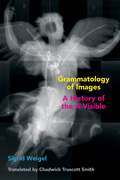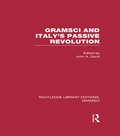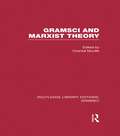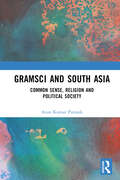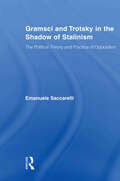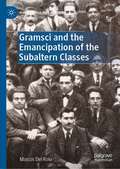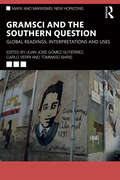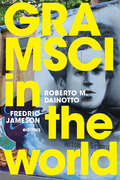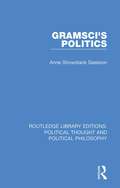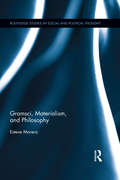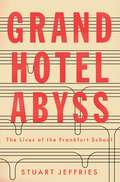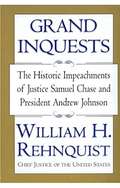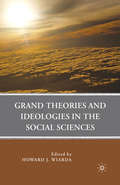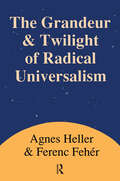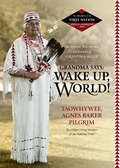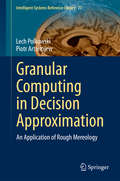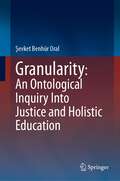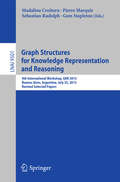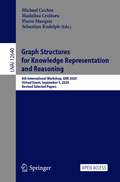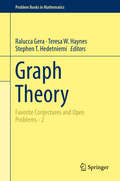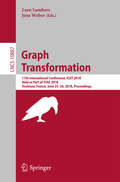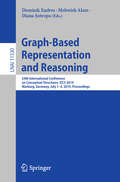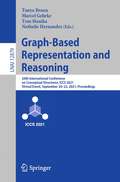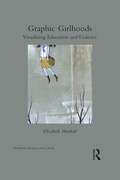- Table View
- List View
Grammatology of Images: A History of the A-Visible (Commonalities)
by Sigrid WeigelGrammatology of Images radically alters how we approach images. Instead of asking for the history, power, or essence of images, Sigrid Weigel addresses imaging as such. The book considers how something a-visible gets transformed into an image. Weigel scrutinizes the moment of mis-en-apparition, of making an appearance, and the process of concealment that accompanies any imaging.Weigel reinterprets Derrida’s and Freud’s concept of the trace as that which must be thought before something exists. In doing so, she illuminates the threshold between traces and iconic images, between something immaterial and its pictorial representation. Chapters alternate between general accounts of the line, the index, the effigy, and the cult-image, and case studies from the history of science, art, politics, and religion, involving faces as indicators of emotion, caricatures as effigies of defamation, and angels as embodiments of transcendental ideas.Weigel’s approach to images illuminates fascinating, unexpected correspondences between premodern and contemporary image-practices, between the history of religion and the modern sciences, and between things that are and are not understood as art.
Gramsci (RLE (RLE (RLE (RLE (RLE (RLE (RLE (RLE: Gramsci): And Italy's Passive Revolution
by John A. DavisAntonio Gramsci used the term ‘passive revolution’ to describe the limitations and weaknesses of the 19th century bourgeois state in Italy which permitted economic development whilst thwarting social and political progress. This detailed study consists of seven essays each exploring a different theme of the economic and social basis of the Liberal state, providing a broad understanding of the background against the emergence of Italian fascism and present a number of debates and controversies amongst Italian historians. By critical discussion of Gramsci’s reading of modern Italian history, the essays present an analysis of the structure and development of social and economic relations in the formation of the Liberal state, illustrating the transition from liberalism to fascism.
Gramsci and Marxist Theory (RLE: Gramsci)
by Chantal MouffeThis book familiarizes the English-speaking reader with the debate on the originality of Gramsci’s thought and its importance for the development of Marxist theory. The contributors present the principal viewpoints regarding Gramsci’s theoretical contribution to Marxism, focussing in particular on his advances in the study of the superstructures, and discussing his relation to Marx and Lenin and his influence in Eurocommunism. Different interpretations are put forward concerning the elucidation of Gramsci’s key concepts, namely: hegemony, integral state, war of position and passive revolution.
Gramsci and South Asia: Common Sense, Religion and Political Society
by Arun Kumar PatnaikGramsci’s theory of common sense is a metanarrative that can be used to explain both religion and political formations. This book examines Gramsci’s perspective and how his theories translate into South Asian society. It explores Gramsci’s historicism, which is sensitive to historical, regional and national differences, and its relevance in post-colonial societies.The volume discusses themes like common sense, religious common sense, folk religion, dialogue and common sense concerning civil/political society through the lens of Gramsci’s historical perspectives. It also looks at Gramscian critique of political secularism, the ideology and politics of Hindutva, civil society in a non-Western context and modes of political society in India.Lucid and topical, this book is a must-read for scholars and researchers of political studies, political philosophy, post-colonial studies, South Asian politics, cultural studies and political sociology.
Gramsci and Trotsky in the Shadow of Stalinism: The Political Theory and Practice of Opposition
by Emanuele SaccarelliThis book examines the legacy of Antonio Gramsci and Leon Trotsky in the shadow of Stalinism in order to reassess the very different and distorted academic reception of the two figures, as well as to contribute to the revitalization of Marxism for our time. While Gramsci and Trotsky lived and died in a similar fashion, as revolutionary Marxist leaders and theoreticians, their reception in academia could not be more different. Gramsci has become tremendously popular, becoming a central figure in many disciplines, while Trotsky remains largely ignored. Saccarelli argues that not only is Gramsci popular for the wrong reasons--being routinely distorted and depoliticized--even when rescued from his contemporary users, Gramsci remains inadequate. Conversely, the fact that Trotsky remains beyond the pale of "theory" is a terrible indictment of the current state of academic thinking.
Gramsci and the Emancipation of the Subaltern Classes (Marx, Engels, and Marxisms)
by Marcos Del RoioThis book outlines essential issues of Antonio Gramsci’s thought, from his relationship to other political thinkers, including Rosa Luxemburg, Lenin, and Machiavelli; the development of his key conceptual categories; and the applicability of those categories in contemporary contexts. The author demonstrates how Gramsci’s revolutionary strategy begins with the knowledge of the subaltern classes’ common sense, and their elements of rebellion, in order to establish a dialectical relationship between intellectuals and the masses. That relationship promotes collective intellectual progress, ultimately leading to an effective philosophy of praxis, founded on labor and a new hegemony. The book demonstrates that Gramsci’s thought offers possibilities for understanding the serious crises of today.
Gramsci and the Southern Question: Global Readings, Interpretations and Uses (Marx and Marxisms)
by Juan José Gómez Gutiérrez, Carlo Verri and Tommaso BarisThis book looks at the Southern question in Antonio Gramsci. It takes this as an opportunity to reflect on the special nature of his thought, linked to the concepts of hegemony, subalternity and the critique of the particular culturalidentitarian and ideological forms of the South and its historical development.Although the category was originally applied to the politics and history of Italy, the debates on the Southern question have in recent times gained wider relevance, combining with today’s more general analyses relating, for example, to European geopolitics, globalisation and the various global Souths, to media and mass culture, etc. In other areas, the Southern question in Gramsci has taken the form of a materialist epistemology, connected to the historical phenomenon of the splitting of consciousness, as opposed to its unity on a theoretical level. Elsewhere, it has become a programme for the application of a strategy of the international left, based on the building of alliances between different groups of subalterns. Over time, Gramsci's thought has come into contact with other partly converging perspectives, such as critical urban theory and cultural and subaltern studies.This has given rise to numerous fruitful lines of research in which the Southern question has been extended from Italy’s own North-South divide to other contexts. What aspect of Gramsci’s thought could justify this issue taking on such importance? Gramsci and the Southern Question: Global Readings, Interpretations and Uses aims to answer this question by combining general theoretical approaches with studies on the reception of Gramscian concepts in the world’s Souths.
Gramsci in the World
by Roberto Dainotto and Fredric JamesonAntonio Gramsci's Prison Notebooks have offered concepts, categories, and political solutions that have been applied in a variety of social and political contexts, from postwar Italy to the insurgencies of the Arab Spring. The contributors to Gramsci in the World examine the diverse receptions and uses of Gramscian thought, highlighting its possibilities and limits for understanding and changing the world. Among other topics, they explore Gramsci's importance to Caribbean anticolonial thinkers like Stuart Hall, his presence in decolonial indigenous movements in the Andes, and his relevance to understanding the Chinese Left. The contributors consider why Gramsci has had relatively little impact in the United States while also showing how he was a major force in pushing Marxism beyond Europe—especially into the Arab world and other regions of the Global South. Rather than taking one interpretive position on Gramsci, the contributors demonstrate the ongoing relevance of his ideas to revolutionary theory and praxis.Contributors. Alberto Burgio, Cesare Casarino, Maria Elisa Cevasco, Kate Crehan, Roberto M. Dainotto, Michael Denning, Harry Harootunian, Fredric Jameson, R. A. Judy, Patrizia Manduchi, Andrea Scapolo, Peter D. Thomas, Catherine Walsh, Pu Wang, Cosimo Zene
Gramsci's Politics (Routledge Library Editions: Political Thought and Political Philosophy #51)
by Anne Showstack SassoonFirst published in 1980. This book analyses Gramsci’s political theory and the consequences of his ideas for the theory of the state and of the political party. Using the new tools of analysis which have been developed in Italy the book presents Gramsci’s political theory as part of the attempt to develop further a Marxist theory of politics. The book also serves as a basis for considering the theoretical foundations of political developments such as Eurocommunism and the author argues that Gramsci’s political thought provides useful instruments for both a critique of Stalinism and of social democracy and offers a grounding for conceptualising democratic forms of socialism which did not simply reinforce the State. This title will be of interest to students of politics, philosophy, and history.
Gramsci, Materialism, and Philosophy (Routledge Studies in Social and Political Thought)
by Esteve MoreraWestern critical theory, Marxism included, has largely been based on a view of historical materialism that Gramsci, among others, developed in his prison notebooks. For many, Gramsci’s philosophical reflections in prison offered a new foundation for the philosophy of the future. His reflections on the philosophy of praxis and absolute historicism find echoes in much of what today is considered to be a materialist philosophy. That form of materialism was unable to provide a sound foundation for a progressive social project, the possibility of a meaningful and creative ethical life, and the forms of activity or praxis that would be conducive to creating good society. In this book, Esteve Morera connects Marxist philosophy to the broader philosophical discussion of materialism in metaphysics, the philosophy science, philosophy of mind, and naturalised ethics. Each chapter deals with a particular aspect related to materialism and its consequences, the sorts of things that, if materialism is true, need to be confronted. Morera critiques, and rejects Gramsci’s conception of matter and materialism and concludes that that philosophical materialism is compatible with freedom, and as a consequence, offers a good foundation for ethical life. Gramsci, Materialism, and Philosophy is an original contribution to the philosophically vital debates around the meaning, limitations, implications, and possibilities of philosophical materialism as it is a contribution to the critical literature on Gramsci.
Grand Hotel Abyss: The Lives of the Frankfurt School
by Stuart JeffriesThis brilliant group biography asks who were the Frankfurt School and why they matter todayIn 1923, a group of young radical German thinkers and intellectuals came together to at Victoria Alle 7, Frankfurt, determined to explain the workings of the modern world. Among the most prominent members of what became the Frankfurt School were the philosophers Walter Benjamin, Theodor Adorno, Max Horkheimer, and Herbert Marcuse. Not only would they change the way we think, but also the subjects we deem worthy of intellectual investigation. Their lives, like their ideas, profoundly, sometimes tragically, reflected and shaped the shattering events of the twentieth century.Grand Hotel Abyss combines biography, philosophy, and storytelling to reveal how the Frankfurt thinkers gathered in hopes of understanding the politics of culture during the rise of fascism. Some of them, forced to escape the horrors of Nazi Germany, later found exile in the United States. Benjamin, with his last great work--the incomplete Arcades Project--in his suitcase, was arrested in Spain and committed suicide when threatened with deportation to Nazi-occupied France. On the other side of the Atlantic, Adorno failed in his bid to become a Hollywood screenwriter, denounced jazz, and even met Charlie Chaplin in Malibu.After the war, there was a resurgence of interest in the School. From the relative comfort of sun-drenched California, Herbert Marcuse wrote the classic One Dimensional Man, which influenced the 1960s counterculture and thinkers such as Angela Davis; while in a tragic coda, Adorno died from a heart attack following confrontations with student radicals in Berlin.By taking popular culture seriously as an object of study--whether it was film, music, ideas, or consumerism--the Frankfurt School elaborated upon the nature and crisis of our mass-produced, mechanised society. Grand Hotel Abyss shows how much these ideas still tell us about our age of social media and runaway consumption.From the Hardcover edition.
Grand Inquests: The Historic Impeachments Of Justice Samuel Chase And President Andrew Johnson
by William H. RehnquistRecounts two precedent-setting impeachment cases that strengthened the concept of separation of powers and further defined the institutions of American government
Grand Theories and Ideologies in the Social Sciences
by Howard J. WiardaThis book analyzes the main competing grand theories in the social sciences, including developmentalism, dependency analysis, Marxism, institutionalism, rational choice, Freudianism, environmentalism, sociobiology, neurosciences, and transitions to democracy.
Grandeur and Twilight of Radical Universalism
by Agnes HellerGrandeur and Twilight of Radical Universalism provides a theoretical construction to the extraordinary events of the past several years in Europe and the Soviet Union, and China. These masterful essays attribute much of the problem of totalitarianism to its blind acceptance of a Marxist philosophy of practice. With the failure of communist practice, the collapse of the Marxian paradigm was quick to follow.At its roots this volume is a critique of the idea that we can have "scientific knowledge" of the social and political future. Totalitarian Marxism combined statements of history and claims of omniscience. Free choice was surrendered to history, and when the predicted outcomes fail to materialize, when communism came closer to being buried than capitalism, and western ideals of democracy proved far more compelling than inherited doctrines of authoritarianism, the outcome proved monumental and disastrous.The authors position themselves as evolving from critical Marxism to post-Marxism, and then post modernism. By this, they mean a modest view of life, one that moves beyond radical universalism and grand narrative, into a realization of individualism and equity concerns are central to the end of the twentieth century. The volume proceeds historically: from studies of the classic Marxian legacy; to the early twentieth century efforts of Lukacs, Weber and Adorno; proceeding to the disintegration of the Marxian paradigm in both its pure and revisionist forms. It ends with a study of options posed by this paradigmatic collapse - to consideration of the status of postmodernity and the choices between pure relativism and a theological fundamentalism. ,This is a work of absolute importance for political philosophy, the sociology of knowledge, and the history of ideas. In raising recent events to a theoretically meaningful framework, it represents a refreshing as well as remarkable step toward understanding Revolutions from 1789 to 1989.
Grandma Says: The Wisdom, Wit, Advice, and Stories of “Grandma Aggie”
by Agnes Baker PilgrimAgnes Baker Pilgrim, known to most as Grandma Aggie, is in her nineties and is the oldest living member of the Takelma Tribe, one of the Confederated Tribes of Siletz.A descendant of both spiritual and political tribal leaders, Grandma Aggie travels tirelessly around the world to keep traditions alive, to help those in need, and to be a voice for the voiceless, helping everyone to remember to preserve our Earth for animals and each other in a spiritual environment.Considered an excellent speaker, she has mesmerized her audience wherever she appears, and now her wit, wisdom, memories, advice, stories and spirituality have been captured for all to hear.Honored as a “Living Cultural Legend” by the Oregon Council of the Arts, Grandma Aggie here speaks about her childhood memories, about her tribe and her life as a child growing up in an area that often didn’t allow Indians and dogs into many public places, as well as about such contemporary issues as bullying, teen suicide, drugs and alcohol, Pope Francis, President Obama, water conservation, climate change, and much more. This is an amazing recording of one of the oldest and most important voices of the First Nation and of the world. Her stories and advice will mesmerize and captivate you, as well as provide a blueprint for how all the inhabitants of the earth can live together in harmony, spirituality, and peace.
Granular Computing in Decision Approximation
by Lech Polkowski Piotr ArtiemjewThis book presents a study in knowledge discovery in data with knowledge understood as a set of relations among objects and their properties. Relations in this case are implicative decision rules and the paradigm in which they are induced is that of computing with granules defined by rough inclusions, the latter introduced and studied within rough mereology, the fuzzified version of mereology. In this book basic classes of rough inclusions are defined and based on them methods for inducing granular structures from data are highlighted. The resulting granular structures are subjected to classifying algorithms, notably k--nearest neighbors and bayesian classifiers. Experimental results are given in detail both in tabular and visualized form for fourteen data sets from UCI data repository. A striking feature of granular classifiers obtained by this approach is that preserving the accuracy of them on original data, they reduce substantially the size of the granulated data set as well as the set of granular decision rules. This feature makes the presented approach attractive in cases where a small number of rules providing a high classification accuracy is desirable. As basic algorithms used throughout the text are explained and illustrated with hand examples, the book may also serve as a textbook.
Granularity: An Ontological Inquiry Into Justice and Holistic Education
by Şevket Benhür OralThis book presents an original exploration of philosophical questions pertaining to the ways we grasp the Absolute by bringing together the Buddhist notion of interpermeation of all phenomena into contemporary strains of thought in continental philosophy. This text introduces an ontological concept, granularity, deploying it to probe questions concerning the intersection of ontology, ethics, and education. A wide range of issues in metaphysics are covered—including being, nothingness, unity, plurality, truth, change, transformation, subjectivity, contradiction, coherence, potentiality—from the perspective of thinkers such as Hegel, Heidegger, Badiou, Meillassoux, Malabou, Žižek, and Harman. The text deploys granularity in arguing for an ethics of unconditional hospitality within education. This volume is intended for students and researchers working in the areas of philosophy of education, philosophy of religion, and continental philosophy.
Graph Structure and Monadic Second-Order Logic
by Bruno Courcelle Joost EngelfrietThe study of graph structure has advanced in recent years with great strides: finite graphs can be described algebraically, enabling them to be constructed out of more basic elements. Separately the properties of graphs can be studied in a logical language called monadic second-order logic. In this book, these two features of graph structure are brought together for the first time in a presentation that unifies and synthesizes research over the last 25 years. The authors not only provide a thorough description of the theory, but also detail its applications, on the one hand to the construction of graph algorithms, and, on the other to the extension of formal language theory to finite graphs. Consequently the book will be of interest to graduate students and researchers in graph theory, finite model theory, formal language theory, and complexity theory.
Graph Structures for Knowledge Representation and Reasoning
by Madalina Croitoru Pierre Marquis Sebastian Rudolph Gem StapletonThis book constitutes the thoroughly refereed post-conference proceedings of the 4th International Workshop on Graph Structures for Knowledge Representation and Reasoning, GKR 2015, held in Buenos Aires, Argentina, in July 2015, associated with IJCAI 2015, the 24th International Joint Conference on Artificial Intelligence. The 9 revised full papers presented were carefully reviewed and selected from 10 submissions. The papers feature current research involved in the development and application of graph-based knowledge representation formalisms and reasoning techniques. They address the following topics: argumentation; conceptual graphs; RDF; and representations of constraint satisfaction problems.
Graph Structures for Knowledge Representation and Reasoning: 6th International Workshop, GKR 2020, Virtual Event, September 5, 2020, Revised Selected Papers (Lecture Notes in Computer Science #12640)
by Madalina Croitoru Pierre Marquis Sebastian Rudolph Michael CochezThis open access book constitutes the thoroughly refereed post-conference proceedings of the 6th International Workshop on Graph Structures for Knowledge Representation and Reasoning, GKR 2020, held virtually in September 2020, associated with ECAI 2020, the 24th European Conference on Artificial Intelligence.The 7 revised full papers presented together with 2 invited contributions were reviewed and selected from 9 submissions. The contributions address various issues for knowledge representation and reasoning and the common graph-theoretic background, which allows to bridge the gap between the different communities.
Graph Theory: Favorite Conjectures And Open Problems - 1 (Problem Books in Mathematics)
by Ralucca Gera Teresa W. Haynes Stephen T. HedetniemiThis second volume in a two-volume series provides an extensive collection of conjectures and open problems in graph theory. It is designed for both graduate students and established researchers in discrete mathematics who are searching for research ideas and references. Each chapter provides more than a simple collection of results on a particular topic; it captures the reader’s interest with techniques that worked and failed in attempting to solve particular conjectures. The history and origins of specific conjectures and the methods of researching them are also included throughout this volume. Students and researchers can discover how the conjectures have evolved and the various approaches that have been used in an attempt to solve them. An annotated glossary of nearly 300 graph theory parameters, 70 conjectures, and over 600 references is also included in this volume. This glossary provides an understanding of parameters beyond their definitions and enables readers to discover new ideas and new definitions in graph theory. The editors were inspired to create this series of volumes by the popular and well-attended special sessions entitled “My Favorite Graph Theory Conjectures,” which they organized at past AMS meetings. These sessions were held at the winter AMS/MAA Joint Meeting in Boston, January 2012, the SIAM Conference on Discrete Mathematics in Halifax in June 2012, as well as the winter AMS/MAA Joint Meeting in Baltimore in January 2014, at which many of the best-known graph theorists spoke. In an effort to aid in the creation and dissemination of conjectures and open problems, which is crucial to the growth and development of this field, the editors invited these speakers, as well as other experts in graph theory, to contribute to this series.
Graph Transformation: 11th International Conference, ICGT 2018, Held as Part of STAF 2018, Toulouse, France, June 25–26, 2018, Proceedings (Lecture Notes in Computer Science #10887)
by Leen Lambers Jens WeberThis book constitutes the refereed proceedings of the 11th International Conference on Graph Transformation, ICGT 2018, held as part of STAF 2018, in Toulouse, France, in June 2018.The 9 full papers, 2 short papers and 1 keynote presented in this book were carefully reviewed and selected from 16 submissions. The papers deal with the following topics: graph languages; graph transformation formalisms; parallel independence and conflicts; and graph conditions and verification.
Graph-Based Representation and Reasoning: 24th International Conference on Conceptual Structures, ICCS 2019, Marburg, Germany, July 1–4, 2019, Proceedings (Lecture Notes in Computer Science #11530)
by Dominik Endres Mehwish Alam Diana ŞotropaThis book constitutes the proceedings of the 24th International Conference on Conceptual Structures, ICCS 2019, held in Marburg, Germany, in July 2019. The 14 full papers and 6 short papers presented were carefully reviewed and selected from 29 submissions. The proceedings also include one of the two invited talks. The papers focus on the representation of and reasoning with conceptual structures in a variety of contexts. ICCS 2019's theme was entitled "Graphs in Human and Machine Cognition."
Graph-Based Representation and Reasoning: 26th International Conference on Conceptual Structures, ICCS 2021, Virtual Event, September 20–22, 2021, Proceedings (Lecture Notes in Computer Science #12879)
by Nathalie Hernandez Tanya Braun Tom Hanika Marcel GehrkeThis book constitutes the proceedings of the 26th International Conference on Conceptual Structures, ICCS 2021, held virtually in September 2021.The 12 full papers and 4 short papers presented were carefully reviewed and selected from 25 submissions. The papers focus on the representation of and reasoning with conceptual structures in a variety of contexts. The papers are organized in the following topical sections: applications of conceptual structures; theory on conceptual structures, and mining conceptual structures.
Graphic Girlhoods: Visualizing Education and Violence (Children's Literature And Culture Ser.)
by Elizabeth MarshallDrawing on a dynamic set of "graphic texts of girlhood," Elizabeth Marshall identifies the locations, cultural practices, and representational strategies through which schoolgirls experience real and metaphorical violence. How is the schoolgirl made legible through violence in graphic texts of girlhood? What knowledge about girlhood and violence are under erasure within mainstream images and scripts about the schoolgirl? In what ways has the schoolgirl been pictured in graphic narratives to communicate feminist knowledge, represent trauma, and/or testify about social violence? Graphic Girlhoods focuses on these questions to make visible and ultimately question how sexism, racism and other forms of structural violence inform education and girlhood. From picture books about mean girls The Recess Queen or graphic novels like Jane, The Fox and Me to Ronald Searle's ghastly pupils in the St. Trinian's cartoons to graphic memoirs about schooling by adult women, such as Ruby Bridges's Through My Eyes and Lynda Barry's One Hundred Demons texts for and about the schoolgirl stake a claim in ongoing debates about gender and education.
